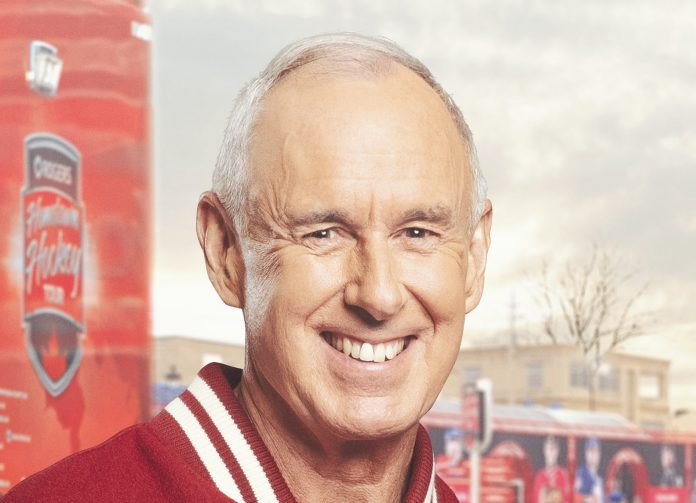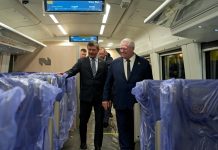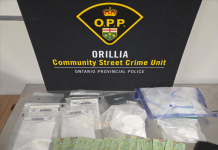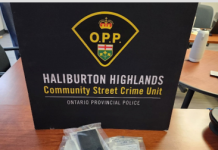Muskoka411 News Director Maddie Binning caught up with sports broadcaster and host Ron MacLean, best known for hosting Hockey Night in Canada, to talk about the return of Rogers Hometown Hockey and the tour’s upcoming stop in Oro-Medonte. Listen to or read the interview below, and click here to read more about the Rogers Hometown Hockey Festival at Horseshoe Resort.
This interview has been lightly edited for clarity.
Of course I know it’s been a little while since you’ve been on the road because of last year’s hiatus. How does it feel to be back at it for Hometown Hockey?
Well, the first show we did was in Ayr, North Dumfries, which is just to the west of Cambridge and honestly, Maddie, I didn’t think we’d get a great turnout. I thought everybody might be a little leery, but it was heaven sent. The community’s 4,100 in population and we had I think 5,000 one day at the festival. Now, they come in waves. We allow a certain number through the gate at 11 and another parcel of folks come through at 1 and so it’s all safe, but it felt really rewarding to just have everyone have the opportunity to get together again.
Absolutely. And what are you looking forward to on your next stop in Oro-Medonte?
Well, if it’s good enough for the Rolling Stones, right? So that’s the first thing. A friend of mine, Eric Zweig, sent a t-shirt from a Stones concert with big cities, Miami, Washington and there in the middle of it is Oro-Medonte and I thought that is the greatest. I was at Horseshoe Resort years ago. In 1987, we had a golf tournament on the day that there was a major trade between Toronto and Chicago and I’ll never forget some very popular Maple Leaf players Steve Thomas, Rick Vaive and Bob McGill were traded away. And they were all at this event and it was in the Horseshoe Resort. And it’s funny, I can remember to this day Todd Gill, a former player, crying as he spoke to the crowd there.
You could feel the hush in the room and just it’s kind of a reminder of how long it’s been around, the love of the Leafs, up in Oro-Medonte and I think it’ll be really nice to profile some of the young stars. Obviously Jessie Eldridge is making her name in the women’s game and we have a great Alex Warmington piece and Andrew Mangiapane played in Barrie and then Isaac Phillips just got up into the NHL with Chicago ironically. So I’m looking forward to the stories we get to tell and to meet Bob Garner. I don’t know if you know that name. Bob, he’s an octogenarian, but you’d never know it. He looks really young and he played in the 50s and 60s. He was probably the best player in Oro-Medonte. He had a 10-goal game, so I’m going to get to meet him on Sunday. Those are some of the highlights.
Great, well, I’m sure Oro-Medonte will be thrilled to have you back. And of course, as someone with such an extensive career in sports and media, how do you think hockey is playing a role in healing the country after all the COVID shutdowns and the struggles that came with them?
That’s good. I think the togetherness of it all. We all kind of remember our first interaction with people who inspire and they come in all different arenas, but hockey is one of them. The feeling you often have on a Saturday night or during the Stanley Cup is that we are all doing this from coast to coast to coast. So there’s a sense of a greater family, a sense of belonging that hockeys always provided and not just hockey, but it’s an easy recognition that this is kind of us. This is a game created, or at least developed fully, in Canada and as I said back to the initial show in Ayr, just togetherness, the companionship.
Ultimately radio and TV are about companionship. They’re about a sense of having someone to share the moments with and think about things and so I remember when we first started the show, I thought it might get to be a little bit gag me with a spoon that we’re celebrating because you celebrate something at the expense of its playfulness. But it’s never been that way. It’s always just such pride, you know. To see the smile on Jessie Eldridge’s face when she talks about her roots in the area, nothing trumps that. That’s a choice you make to play a game and it’s your individual freedom and then there’s your power as a human, your athletic prowess. The combination generally of your power as a person and your freedom to make a choice, that equals healing, so it’s kind of an indirect way of saying hockey sure helps.
Absolutely. Well, and of course heading into season eight, what do you think it is about Hometown Hockey that continues to captivate fans across Canada?
Well, that’s a hard one. The show, I hope, has a bit of an ethos. I think it’s in the arena of some of the social movements that we are experiencing without it having to be too heavy handed because it’s hockey people just saying, ‘Here’s what I stand for.’ So I think that’s one of the attractions. Usually at core, all the shows that are kind of traveling roadshows, whether it was Rick Mercer, or there’s a million of them, Wayne Rostad, Wide World of Sports, traveling shows allow the world to reflect itself to one another or Canadians to reflect themselves to one another. And that’s comforting. There’s a bit of each of us that wishes to see how others are dealing with this thing called life. Nothing more magical than that. It’s a simple reflection of ourselves in different parts of the country and that, I think, is the attraction.
Definitely. And from a professional perspective, how does your work on Hometown Hockey compare to the other roles and projects you’ve worked on throughout your career?
Well, it takes me back to being an Air Force brat for one. It certainly reminds me of my years refereeing hockey and traveling on highways in the dark of the night to find an arena in a small town. It reminds me always of kind of the backbone of things, so it certainly helps to teach me things. Ultimately, everything is about sport or things like sport and society and stories and you gain so much in terms of storytelling. I can’t tell you how many times I do the Stanley Cup playoffs after having been on the road all year and all the things that you learn in the 25 stops during the season seem to come up during the Stanley Cup playoffs. Stories of how somebody made it, stories of resilience, stories of a secret recipe for success. Some coach that’s figured out a way to motivate or to tactically gain an advantage and it’s unique to that small town or that person. So yeah, it’s a great teacher, that’s the biggest thing I could say about what it does for me is what travel has always done for humanity—it just opens your mind.
Right and kind of on that note as well, after seeing so many communities across the eight seasons, what keeps you interested and excited to visit new places every season?
Well, for sure the discovery of a new story. The experience of, again, it’s companionship, the chance to be with fellow rink rats, that’s exciting. Sometimes, like when we were in Ayr, we learned about the chicken wing sauce there and I’ve had the pleasure of caribou heart in Thompson, Manitoba or seal burgers in St. John’s, Newfoundland and so on. That’s part of the fun, the culinary escapades of your travels, and just I keep coming back to the learning that goes on, the power of a conversation. Like the old adage in comedy, if the jokes funny, the people will laugh. You can’t tell where we’re at in terms of our sensitivities, sensibilities, loves, passions, unless you step out of the, in this case, the Rogers Centre, broadcasting centre, and get out and exchange ideas so it’s pennies from heaven to have the opportunity.
Right, and I know of course you mentioned a few highlights. Are there any stories or cities that stand out to you after all your years on the program?
Tara probably spoke about this. The real eye opener was the role of the Indigenous communities across Canada, both in the game and in terms of the work we do as broadcasters. [It was] sort of an unbelievable epiphany to spend time with Grand Chief Wilton Littlechild and to learn from Kathryn Teneese in Cranbrook, to learn from Tania Willard in Kamloops, to learn from Chief Stacey Laforme in Niagara. It just goes on and on. That has been the biggest revelation is that the game is extremely woven into—I think we tend to associate the Indigenous history of sport in Canada with lacrosse, but it’s deeply deeply rooted in hockey too. Obviously the hockey stick was created by the Mi’kmaq in Nova Scotia, so that was just a fantastic opportunity given to us by traveling. And then, in all those stops, invariably, often unbeknownst to us, a chief or an elder would come by with an anecdote about the connection between 10,000 years of history and 100 [years of hockey], so yeah, that’s the biggest breakthrough.
Great. Well, is there anything else I didn’t ask about that you’d really want to mention?
I hope people come out and enjoy the festival. It looks like we have great weather in store, so it runs 11 to 5 on Saturday, Sunday. And then there’s also an opportunity to go to HometownHockey.com to get your tickets, free tickets, of course, to come. Everything’s free. But you can come and be part of the viewing party on Monday evening, it’s a Toronto Maple Leaf telecast, so we’re lucky to have that. And just everyone’s invited and bring your ideas and bring your charm.
For more information, visit the Rogers Hometown Hockey website, and read the article below to learn more about Hometown Hockey’s stop in Oro-Medonte from Nov. 6 to 8.
Rogers Hometown Hockey Visits Horseshoe Resort In Oro-Medonte This Weekend








